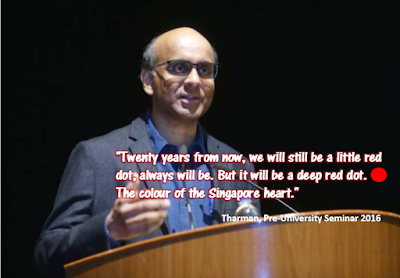The Singapore 20 years from now will be an innovative and deeply inclusive one, where a new generation of Singaporeans define their own purpose in life, each with a sense of individuality, in a society that is bound together and at home with itself, said Deputy Prime Minister Tharman Shanmugaratnam yesterday.
Painting a picture of what the Republic will be like in 2035, based on a poll of students, he said: "Twenty years from now, we will still be a little red dot, always will be.
"But it will be a deep red dot. The colour of the Singapore heart."
Education, he said, would become more holistic, flexible and encouraging.
A more flexible system and a focus on skills and job performance, rather than qualifications earned early in life, will be needed instead for the fluid job market of the future, noted Mr Tharman.
Citing an informal survey MOE did to find out the aspirations of seminar participants, Mr Tharman noted that students ranked job satisfaction and the ability to make the most of one's talents, above factors like pay and career progress. Most also felt the Singapore of the future has to be innovative and inclusive.
Whether or not these aspirations could be met would depend on how Singapore reacts to changes in areas such as technology and geopolitics, said Mr Tharman.
Some jobs - such as software engineers, data scientists and healthcare professionals - could be in demand, while demand for lawyers, accountants and real estate or insurance agents could taper off.
While there is a "real fear" in many advanced countries that the jobs lost will outstrip the jobs created, Singapore can avoid that by responding in advance to what is coming, said Mr Tharman.
Studies show it is more productive for humans to "cobot" - collaborate with robots - than to have enterprises that rely purely on humans or robots alone.
Education will also evolve, with a premium on original thinking, which breeds the innovative spirit.
The way students and parents go about selecting schools will change, he said, with people valuing schools that develop their interests rather than schools with the highest cut-off scores.
But there is a "deeper tension" between innovation and inclusiveness, said Mr Tharman.
**While young Singaporeans will have a stronger sense of individuality, Singapore must not become an individualistic society but maintain a "spirit of solidarity" with "diversity of thinking" .
"It is a tension, but how this plays out depends on us," said Mr Tharman.
Mr Tharman was speaking at the opening ceremony of the Pre-University Seminar held at the Nanyang Technological University.
http://



